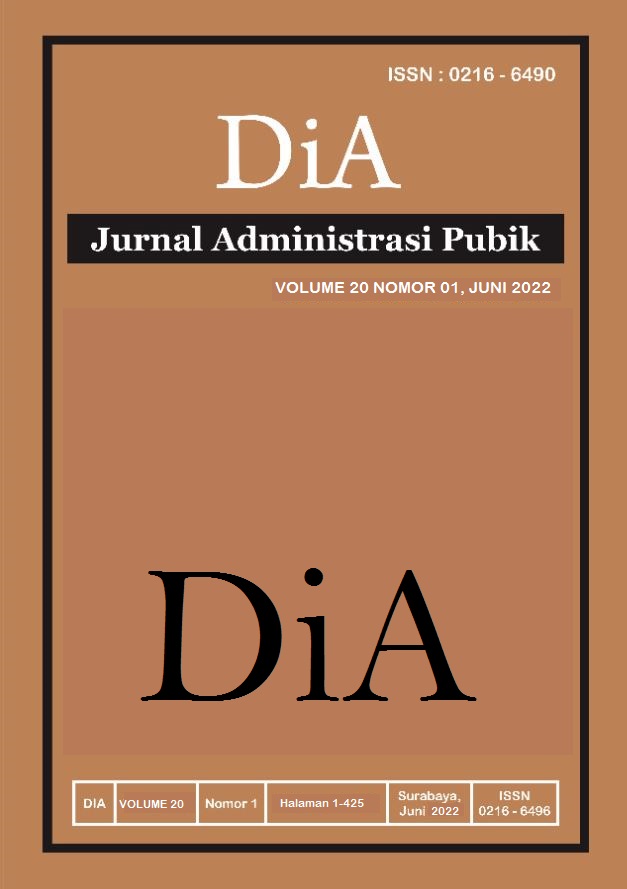COLLABORATIVE GOVERNANCE MODEL IN INDONESIAN INNOVATION STARTUP PROGRAM: THE MASKIT STARTUP CASE STUDY
DOI:
https://doi.org/10.30996/dia.v20i01.6350Keywords:
Startup, SMEs, innovation, collaborative governanceAbstract
This study aims to identify, describe, and analyze collaborative governance models of public services in the Indonesian Innovation Startup (SII) program conducted by the Directorate of Technology-Based Start-ups, National Research and Innovation Agency (BRIN). This study uses the Integrative Framework for Collaborative Governance in realizing organizational goals. This concept is used in order to analyze the role of stakeholders in participating in realizing collaborative government governance in the implementation of the Indonesian Innovation Startup program. This research uses qualitative research with the case study method of the Maskit startup in the Indonesian Innovation Startup (SII) program. The data sources come from documents regarding the SII program and the concept of collaborative governance as well as interviews from various sources. The data are collected through interviews, observations, and documentation carried out by involving related parties, namely the program organizers (government), participants (startup companies), and incubators. The results of the study show that the collaborative governance process in the SII program followed by the Maskit startup, has generally implemented the concept of the Integrative Framework for Collaborative Governance. All elements within the framework, including principled engagement, shared motivation, and joint capacity, have been implemented by all stakeholders involved, namely BRIN as the organizer of the SII program, Maskit as the startup participating in SII, and University of Indonesia as the incubator. This research is expected to enrich academic studies on collaborative governance in the realm of public policy and can be used as a reference for those who wish to conduct similar research or create collaborative programs with elements of government, universities, SMEs, and various other relevant parties.
Downloads
References
Ansell, C., & Gash, A. (2008). Collaborative governance in theory and practice. Journal of Public Administration Research and Theory, 18(4), 543–571. https://doi.org/10.1093/jopart/mum032
Bank Indonesia. (2021). Laporan Pelaksanaan Tugas dan Wewenang Bank Indonesia Triwulan II 2021.
Catriana, E. (2021). Kaleidoskop 2021: Tahun Penuh Harapan bagi Pelaku UMKM. Retrieved February 21, 2022, from https://money.kompas.com/read/2021/12/29/114430626/kaleidoskop-2021-tahun-penuh-harapan-bagi-pelaku-umkm?page=all
Coordinating Ministry for the Economy (2021). Pengembangan Ekonomi Berbasis Digital untuk Tingkatkan Daya Saing Generasi Muda di Era Industri 4.0. Retrieved February 25, 2022, from https://ekon.go.id/
________. (2021). Siaran Pers: UMKM Menjadi Pilar Penting dalam Perekonomian Indonesia. Retrieved February 21, 2022, from https://ekon.go.id/publikasi/detail/2969/umkm-menjadi-pilar-penting-dalam-perekonomian-indonesia
CNN Indonesia. (2019). Mengenal Istilah Unicorn dalam “Dunia” Startup. https://www.cnnindonesia.com/teknologi/20190218014809-185-370201/mengenal-istilah-unicorn-dalam-dunia-startup
Emerson, K., Nabatchi, T., & Balogh, S. (2011). An Integrative Framework for Collaborative Governance. Journal of Public Administration Research & Theory, 22, 1-29. https://doi.org/10.1093/jopart/mur011
Emerson, K., & Nabatchi, T. (2015). Collaborative Governance Regimes. Georgetown University Press.
Goldsmith, L. J. (2021). Using Framework Analysis in Applied Qualitative Research. The Qualitative Report, 26(6), 2061-2076. https://doi.org/10.46743/2160-3715/2021.5011
Hardiansyah, R., & Tricahyono, D. (2019). Identifikasi Faktor-Faktor Kesuksesan Start Up Digital di Kota Bandung. Retrieved from http://je.ejournal.unri.ac.id/
Ibrahim, Z., Abdullah, F., & Ismail, A. (2016). International Business Competence and Small and Medium Enterprises. Procedia - Social and Behavioral Sciences, 224, 393–400. https://doi.org/10.1016/j.sbspro.2016.05.402
Karina, D., Alfiyatus Sa’diyah, S., Nabilah, H., & Panorama, M. (2021). Pengaruh Perusahaan Startup Terhadap Pertumbuhan Ekonomi Indonesia Selama Pandemi Covid-19. Berajah Journal, 2(1), 156–166. https://doi.org/10.47353/bj.v2i1.69
Ministry of Finance. (2021). Ekonomi Digital Indonesia Diprediksi Tumbuh Delapan Kali Lipat di Tahun 2030. Retrieved February 21, 2022, from https://www.kemenkeu.go.id/publikasi/berita/ekonomi-digital-indonesia-diprediksi-tumbuh-delapan-kali-lipat-di-tahun-2030/
Ministry of Cooperatives and SMEs. (2021). Peraturan Pemerintah Republik Indonesia Nomor 7 Tahun 2021 Tentang Kemudahan, Pelindungan, dan Pemberdayaan Koperasi dan Usaha Mikro, Kecil, dan Menengah.
National Research and Innovation Agency (BRIN). (2021). Startup Inovasi Indonesia.
Nurhayati, F. (2021). UMKM Pulihkan Ekonomi di Tengah Pandemi. Retrieved February 21, 2022, from https://katadata.co.id/padjar/infografik/615d17836941a/umkm-pulihkan-ekonomi-di-tengah-pandemi
Tech Collective. (2020). The denitive guide to technology in Southeast Asia How did Indonesian startups fare in 2020? Jakarta. Retrieved February 22, 2022 from https://techcollectivesea.com/2020/12/11/how-did-indonesian-startups-fair-in-2020/
Ulya, F. N. (2019). Indonesia Punya 1 Decacorn dan 4 Unicorn. Retrieved February 22, 2022, from https://money.kompas.com/read/2019/12/31/111200626/kaleidoskop-2019-indonesia-punya-1-decacorn-dan-4-unicorn?page=all.
Downloads
Published
How to Cite
Issue
Section
License
The DiA journal allows authors to retain the copyright of their papers without limitation. Authors may grant publishers non-exclusive publishing rights to publish articles. Granting first publishing rights to publishers also qualifies as unlimited copyright (because there are no restrictions imposed by publishers on author copyright).







